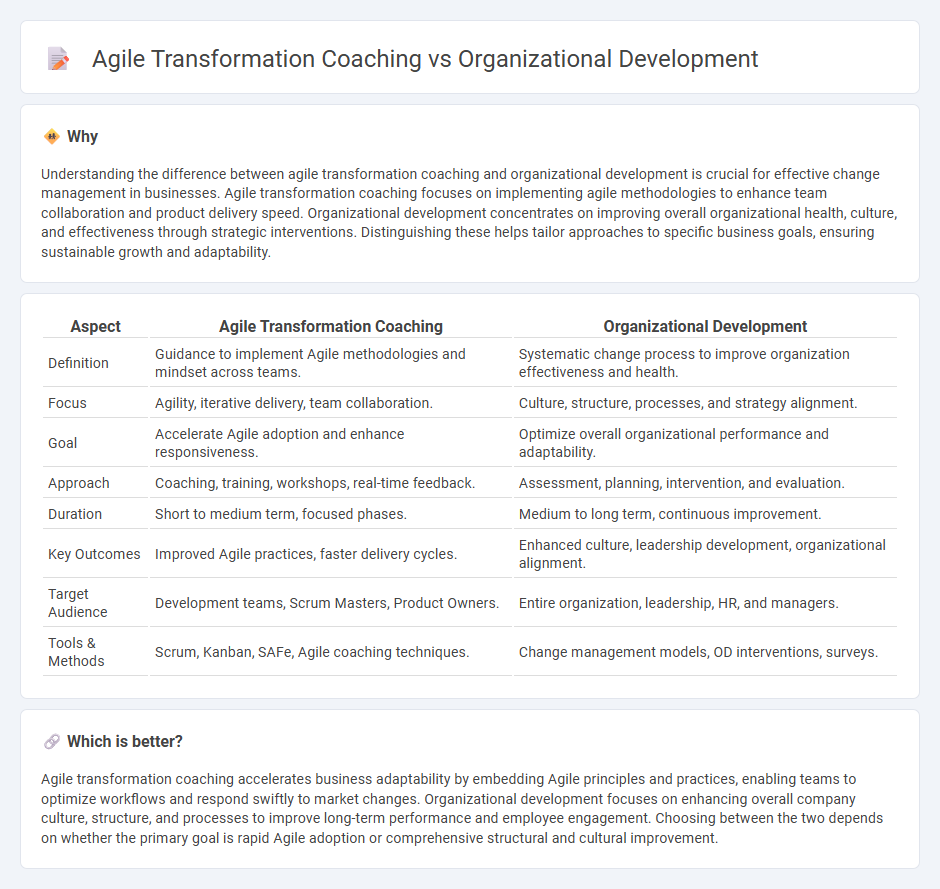
Agile transformation coaching focuses on guiding teams and leaders through iterative processes to improve flexibility, collaboration, and delivery speed within an organization. Organizational development emphasizes systemic change by enhancing overall culture, structures, and workflows to increase long-term effectiveness and employee engagement. Explore the distinct benefits of agile transformation coaching versus organizational development to identify the best fit for your company's growth strategy.
Why it is important
Understanding the difference between agile transformation coaching and organizational development is crucial for effective change management in businesses. Agile transformation coaching focuses on implementing agile methodologies to enhance team collaboration and product delivery speed. Organizational development concentrates on improving overall organizational health, culture, and effectiveness through strategic interventions. Distinguishing these helps tailor approaches to specific business goals, ensuring sustainable growth and adaptability.
Comparison Table
| Aspect | Agile Transformation Coaching | Organizational Development |
|---|---|---|
| Definition | Guidance to implement Agile methodologies and mindset across teams. | Systematic change process to improve organization effectiveness and health. |
| Focus | Agility, iterative delivery, team collaboration. | Culture, structure, processes, and strategy alignment. |
| Goal | Accelerate Agile adoption and enhance responsiveness. | Optimize overall organizational performance and adaptability. |
| Approach | Coaching, training, workshops, real-time feedback. | Assessment, planning, intervention, and evaluation. |
| Duration | Short to medium term, focused phases. | Medium to long term, continuous improvement. |
| Key Outcomes | Improved Agile practices, faster delivery cycles. | Enhanced culture, leadership development, organizational alignment. |
| Target Audience | Development teams, Scrum Masters, Product Owners. | Entire organization, leadership, HR, and managers. |
| Tools & Methods | Scrum, Kanban, SAFe, Agile coaching techniques. | Change management models, OD interventions, surveys. |
Which is better?
Agile transformation coaching accelerates business adaptability by embedding Agile principles and practices, enabling teams to optimize workflows and respond swiftly to market changes. Organizational development focuses on enhancing overall company culture, structure, and processes to improve long-term performance and employee engagement. Choosing between the two depends on whether the primary goal is rapid Agile adoption or comprehensive structural and cultural improvement.
Connection
Agile transformation coaching accelerates organizational development by embedding adaptive methodologies and fostering a culture of continuous improvement. This connection enables businesses to respond swiftly to market changes, optimize workflows, and enhance employee engagement. Effective organizational development provides the structural foundation for agile principles to thrive, driving sustainable growth and innovation.
Key Terms
Change Management
Organizational development emphasizes holistic change management strategies to align culture, structure, and processes with long-term business goals, whereas agile transformation coaching focuses on iterative change practices to enhance team agility and responsiveness. Change management in organizational development involves systematic stakeholder engagement and communication plans, while agile transformation coaching prioritizes adaptive learning and continuous feedback loops within teams. Explore deeper insights into how these approaches shape effective change management in modern enterprises.
Continuous Improvement
Organizational development emphasizes long-term strategic changes to enhance company culture and processes, while agile transformation coaching targets specific practices aimed at iterative progress and adaptability. Continuous improvement in organizational development integrates systemic feedback loops for sustainable growth, whereas agile coaching drives incremental enhancements through sprint cycles and real-time collaboration. Explore the nuances of these approaches to optimize your organization's performance effectively.
Cross-functional Collaboration
Organizational development emphasizes structured improvement of processes and culture, while agile transformation coaching promotes adaptive, iterative collaboration across teams. Both approaches aim to enhance cross-functional collaboration by breaking down silos and fostering seamless communication among diverse departments. Explore further to understand which strategy best fits your organization's growth and agility goals.
Source and External Links
What Is Organizational Development? A Complete Guide - AIHR - Organizational Development (OD) is a planned, staged process designed to support growth, innovation, and cultural transformation in organizations through diagnosing problems, intervening with strategic actions, evaluating results, and embedding change into daily operations.
What is Organizational Development? - IBM - Organizational Development is a systematic, research-driven effort focused on improving organizational strategies, culture, performance, and adaptability by aligning human behavior with business goals for sustainable success.
What Is Organization Development? - TD.org - OD improves an organization's capability through aligning strategy, structure, people, and processes using a holistic, interdisciplinary, and strategic approach that differs from traditional HR by taking a broader organizational view.
 dowidth.com
dowidth.com